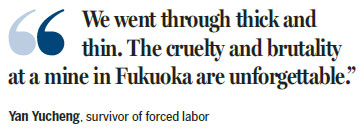Slave laborers: Japan, businesses owe us
Japan's government and businesses should apologize to and compensate all the laborers who were forced to work in Japan during World War II, Chinese survivors of the forced labor and Japanese activists said in Tokyo on Monday.
"We went through thick and thin. The cruelty and brutality at a mine in Fukuoka are unforgettable," Yan Yucheng, 90, a survivor of forced labor, said in a choked voice.
Yan was kidnapped in a village in Hebei province in April 1942 when he was 15. Along with his uncle and 17 other kidnapped Chinese farmers, he was sent by the Japanese military to southwest Japan's Kyushu. He survived the slave-like conditions and went back to China in December 1945. Having no news about him, Yan's mother suffered mental disorders.
Many Chinese laborers did not make it back home.
On Nov 27, 1942, Japanese prime minister Hideki Tojo's cabinet decided to forcibly take Chinese people to Japan and make them work.
According to a report compiled by Japan's Ministry of Foreign Affairs in 1946, 38,935 Chinese ages 11 to 78 were forcibly sent to Japan. They toiled at 35 Japanese companies' 135 mines, construction sites and docks from Hokkaido to Kyushu. The report showed that 6,830 workers - more than one in six - died.
Some Japanese companies have settled with former Chinese forced laborers.
Last year, Mitsubishi Materials apologized to Chinese workers who were forced to work in its predecessor company's mines during WWII and agreed to pay redress to them, including three surviving former laborers.
Yan, one of the three survivors, said Mitsubishi Materials acted wisely and he called on other Japanese companies to follow suit.
"As the wartime cabinet made the decision to forcibly take Chinese laborers, not only companies, but the Japanese government also should apologize and pay compensation to all the forced laborers," Yan said.
Kan Cuihua, daughter of Kan Shun - the 99-year-old former laborer who is now confined to a bed - asked the Japanese government to take responsibility and settle the war-related issue.
Taizo Morita, a Japanese lawyer, recommended that the Japanese government and companies that used Chinese laborers forcibly taken to Japan apologize to the victims and set up a fund of 100 billion yen ($898.5 million) to pay redress to Chinese forced laborers in wartime Japan - survivors and families of those who passed away - and for conducting research and education on the issue. Also, the fund could be used, Morita said, to promote exchanges between Japanese and Chinese youngsters, who will determine the future of the bilateral ties.
caihong@chinadaily.com.cn

(China Daily 11/28/2017 page3)


















